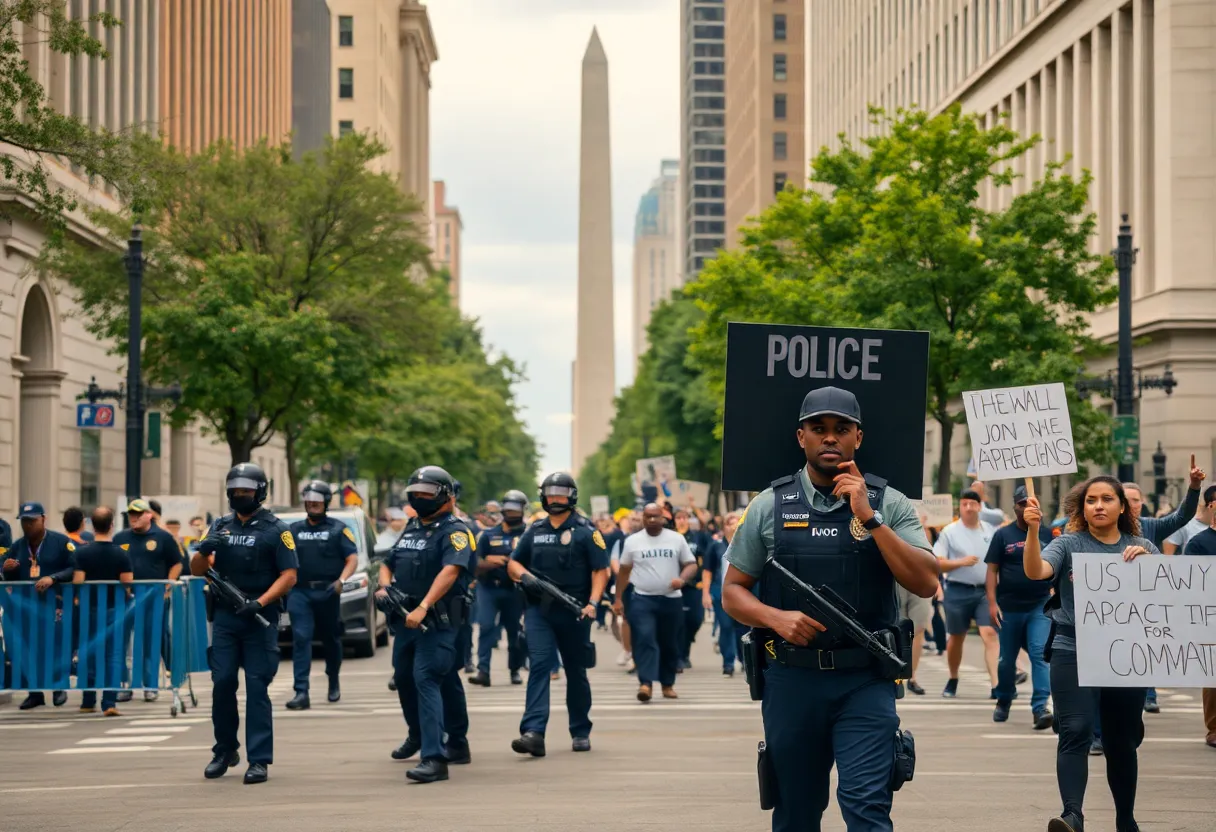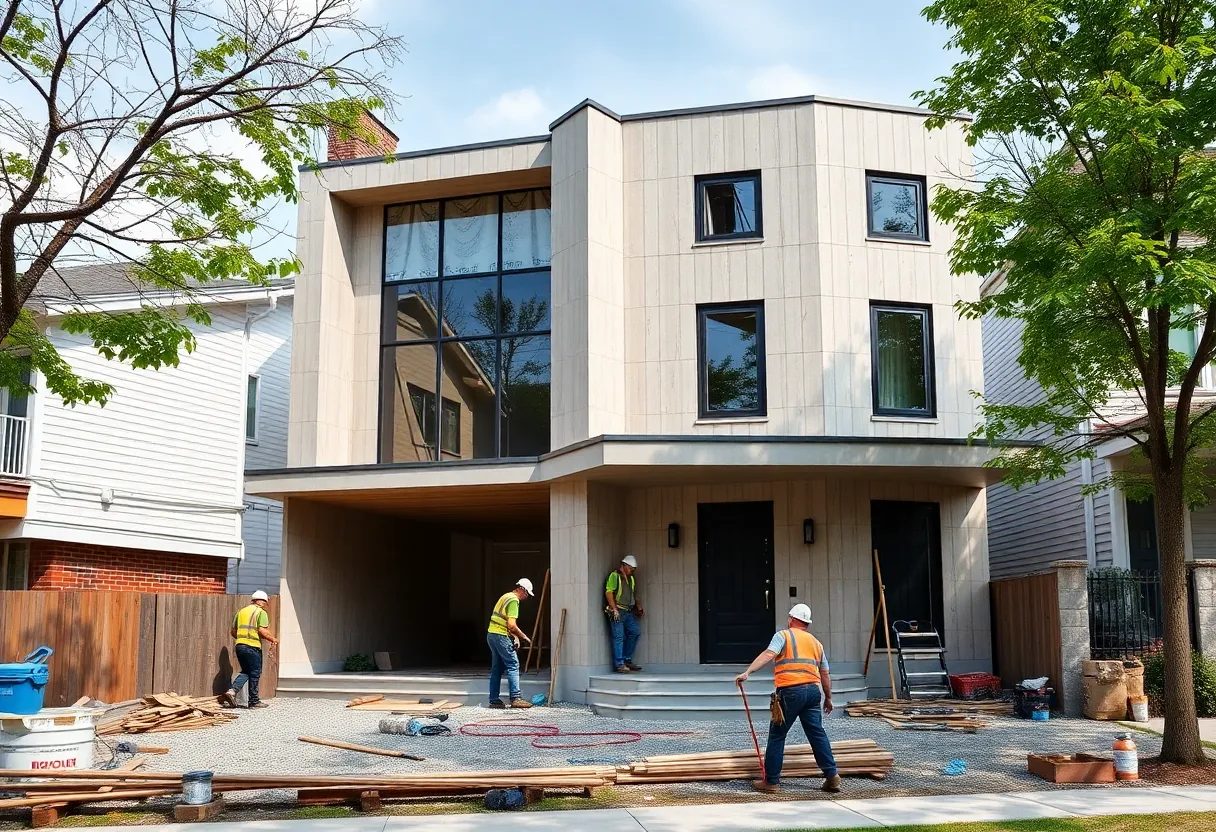News Summary
President Trump’s controversial 30-day takeover of the Metropolitan Police Department in Washington D.C. is set to end, following declarations of a public safety emergency. While reported crime rates have decreased, the measures faced criticism over civil rights violations. Local officials, including Mayor Muriel Bowser, advocate for a return to normal governance while concerns about ongoing federal presence and community relations persist.
Washington D.C. – President Donald Trump’s direct control of the Metropolitan Police Department (MPD) is set to conclude on Wednesday, marking the end of a controversial 30-day takeover initiated by the president on August 11. During this period, Trump declared a “public safety emergency,” which led to the deployment of federal officers and the activation of the National Guard.
With Trump’s control ending, it is expected that hundreds of federal police officers and National Guard troops will continue to remain stationed in the city. Trump recently expressed confidence in the city’s safety, claiming it has become “virtually crime free” with significant crime reductions reported over the past year and two decades.
Trump’s takeover is governed by the District of Columbia Home Rule Act, which restricts presidential control over local police to 30 days unless Congress authorizes an extension. Republican House Speaker Mike Johnson indicated there are currently no plans for Congress to vote on extending Trump’s authority over the MPD, partly due to the cooperation demonstrated by D.C. Mayor Muriel Bowser during the emergency.
During the control period, Justice Department data reported that there were 2,310 arrests made and 225 illegal firearms confiscated. The MPD indicated a notable 15% decrease in overall crime compared to the same timeframe the previous year, with violent crime declining by 39%. Notably, Washington D.C.’s violent crime rate had already been on a downward trend prior to this intervention, recording the lowest levels of violent offenses in three decades.
Despite these statistics, the measures taken during Trump’s control have faced significant criticism. Observers pointed out issues such as indiscriminate detentions, allegations of racial profiling, and arrests for low-level offenses. Additionally, the city’s attorney general has initiated a lawsuit against the Trump administration regarding the constitutionality of deploying the National Guard.
As discussions continue regarding reforms to Washington’s criminal justice system, various lawmakers are proposing legislation to adjust policies, notably considering lowering the prosecution age for juveniles and amending the way the D.C. attorney general is appointed, potentially moving to a presidential appointment.
Trump has hinted at plans for a new law enforcement initiative in another city and suggested enhancing federal support in Democratic-run cities like Chicago and Los Angeles. Locally, Mayor Bowser has advocated for an exit strategy from the federal takeover, stating that her order was intended to coordinate with federal law enforcement agencies rather than extending Trump’s control.
Although the emergency and Trump’s direct oversight are ending, the presence of National Guard members may persist under separate military orders that could extend beyond this takeover. Once the emergency concludes, the MPD will revert to its regular duties, explicitly excluding immigration enforcement operations.
Concerns have arisen about the substantial number of arrests connected to immigration-related issues during the takeover, leading to heightened fears within immigrant communities. Local residents have expressed frustration regarding what they perceive as a federal “occupation” and have organized protests against the federal enforcement presence.
The aftermath of Trump’s crackdown is reflected in an increasing sense of fear and distrust towards law enforcement among the city’s residents, particularly from minority communities. Reports indicate that many residents are concerned about how the policies implemented during this police takeover might affect community relations moving forward.
As Washington prepares to transition back to typical police governance, the implications of Trump’s brief control over law enforcement will likely continue to resonate throughout the city, affecting its residents and their relationship with law enforcement agencies.
Deeper Dive: News & Info About This Topic
HERE Resources
Protests Erupt in DC Against Trump’s Federal Interventions
D.C. Restaurants Struggle Amid Increased Police Presence
Thousands Protest National Guard Deployment in D.C.
Protests Erupt in Washington, D.C. Against Military Presence
Surge in Immigration Enforcement Creates Fear in DC
Loeffler Supports Trump’s Law and Order Focus in D.C.
Washington, D.C. Protest Against Federal Policing Takeover
D.C. Files Lawsuit Against Trump Over National Guard Deployment
Independent Bookstores Struggle Amidst Federal Intervention in DC
Washington D.C. Mayor Implements New Federal Cooperation Agreement
Additional Resources
- CNN: Trump’s control of D.C. police ending
- Wikipedia: Washington, D.C.
- The Guardian: Trump’s D.C. police takeover
- Google Search: Washington D.C. police takeover
- Washington Post: End of Trump’s D.C. Emergency
- Encyclopedia Britannica: Donald Trump
- AP News: Donald Trump News Updates
- Google News: Trump Washington D.C. police emergency
- USA Today: End of Trump’s D.C. Police Takeover
- BBC News: D.C. Takeover Ending

Author: STAFF HERE WASHINGTON DC
The WASHINGTON DC STAFF WRITER represents the experienced team at HEREWashingtonDC.com, your go-to source for actionable local news and information in Washington, DC, and beyond. Specializing in "news you can use," we cover essential topics like product reviews for personal and business needs, local business directories, politics, real estate trends, neighborhood insights, and regional news affecting the area—with deep expertise drawn from years of dedicated reporting and strong community input, including local press releases and business updates. We deliver top reporting on high-value events such as the National Cherry Blossom Festival, Kennedy Center Honors, and the Washington Auto Show. Our coverage extends to key organizations like the Greater Washington Board of Trade and Destination DC, plus leading businesses in government contracting and technology that power the local economy such as Lockheed Martin and Amazon. As part of the broader HERE network, we provide comprehensive, credible insights into the dynamic landscape of the Washington metropolitan area.




